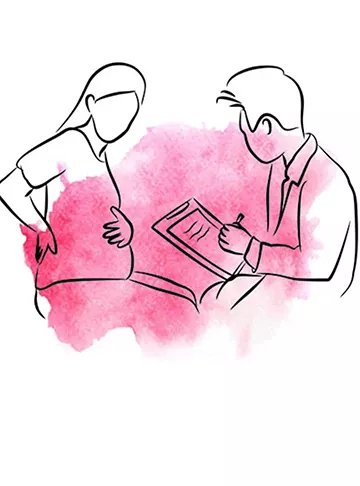Infertility can be a challenging journey for many couples, but understanding the infertility workup testing procedure can provide clarity and direction. Let’s outline the infertility workup procedure step by step, highlighting the key aspects of the infertility testing procedure.
Infertility Workup Procedure Step-by-Step
1. Initial Consultation: The first step in the infertility workup procedure is an initial consultation with a fertility specialist. During this visit, the specialist will review your medical history, discuss previous treatments or pregnancies, and conduct a physical examination.
2. Diagnostic Tests: After the initial consultation, the next step in the infertility workup process is diagnostic testing. These tests help identify any underlying causes of infertility and may include:
- Ovulation Testing: This test helps determine if you are ovulating regularly. It may involve tracking your basal body temperature, using ovulation predictor kits, or undergoing blood tests to measure hormone levels.
- Semen Analysis: For male partners, a semen analysis is performed to evaluate the quantity and quality of sperm. This test is crucial in determining male fertility.
- Hormone Testing: Hormone testing assesses the levels of various hormones involved in the reproductive process, such as FSH, LH, estradiol, and testosterone.
-
Hysterosalpingogram (HSG) : This test involves injecting a dye into the uterus and fallopian tubes to check for blockages in fallopian tubes or abnormalities.
-
Pelvic Ultrasound: A pelvic ultrasound may be performed to assess the health of the reproductive organs, including the uterus, ovaries, and fallopian tubes.
-
Genetic Testing: In some cases, genetic testing may be recommended to identify any genetic abnormalities causing infertility.
3. Additional Tests: Depending on the initial test results, additional tests may or may not be recommended. These may include:
- Sonohysterogram: This test involves injecting saline into the uterus and using ultrasound to create images. It helps assess the uterine cavity for abnormalities.
- Laparoscopy: In some cases, a laparoscopy may be performed to visually examine the reproductive organs for any abnormalities or blockages.
- Endometrial Biopsy: An endometrial biopsy may be done to evaluate the lining of the uterus for any abnormalities.
- Genetic Screening: Genetic screening may be recommended to identify any genetic mutations that could be contributing to infertility.
4. Evaluation of Results: Once all the tests are completed, the fertility specialist will evaluate the results to determine the cause of infertility. Based on these findings, a treatment plan will be recommended.
5. Treatment Options: Treatment options for infertility vary depending on the underlying cause and may include:
- Medications: Fertility medications may be prescribed to stimulate ovulation or improve sperm production.
- Surgery: In cases where there are structural abnormalities or blockages, surgery may be recommended to correct the issue.
- Assisted Reproductive Technologies (ART): ART treatments, such as In Vitro Fertilization (IVF), may be recommended for couples with more complex infertility issues.
- Lifestyle Changes: Making lifestyle changes, such as maintaining a healthy weight, quitting smoking, and reducing alcohol consumption, can also improve fertility.
6. Follow-up: After starting treatment, regular follow-up appointments will be scheduled to monitor progress and adjust the treatment plan if necessary.
Overall, the infertility testing process is a thorough process that involves a series of tests and evaluations to determine the cause of infertility. Couples can gain a better understanding of their fertility issues and explore appropriate treatment options under the guidance of a specialist doctor.
Pregnancy Calculator Tools for Confident and Stress-Free Pregnancy Planning
Get quick understanding of your fertility cycle and accordingly make a schedule to track it
Get a free consultation!















